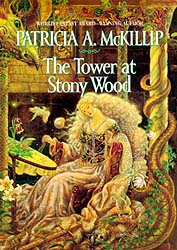Authors don't get to choose their cover art, which should come as no surprise to any reader who has ever scratched her head over a cover that seemed to have nothing to do with the novel inside. It always comes as a surprise to my middle schoolers, who often describe characters based on the cover and not the writing in the book.
Still, you'd think a publisher would want the most successful, eye-catching cover affordable, right? That's why books are constantly being reissued with updated covers.
Which of these two books would you be more likely to pick up, for instance?

 The first image is the newer edition, so Penguin is hoping you picked door number one. Personally, I'm partial to the blue copy because that's the one I own. And because, if you look very carefully, you can see the shadow of the sea monster rising between the two pillars of rock. The sea monster is very, very important. (The Changeling Sea by Patricia McKillip: great short fantasy. One of my favorites.)
The first image is the newer edition, so Penguin is hoping you picked door number one. Personally, I'm partial to the blue copy because that's the one I own. And because, if you look very carefully, you can see the shadow of the sea monster rising between the two pillars of rock. The sea monster is very, very important. (The Changeling Sea by Patricia McKillip: great short fantasy. One of my favorites.)
How about these two?
Here's another puzzler for you. If a particular artist is well-known for providing the cover art of a particular author, is it cheating for a publishing company to have that artist do almost the same sort of thing for a different (but similar) author?

Next is the cover of Juliet Marillier's very enjoyable Wildwood Dancing. You may be able to tell that it, too, is by Craft. I certainly could, because when I saw it in the library I immediately snatched it up, thinking I'd somehow missed news of the latest McKillip. After the shock of discovering that a Craft painting contained the novel of a different author, I thought the novel might have a bit of an uphill battle with me. However, Marillier's own style and unique take on the tale of the twelve dancing princesses drew me right in.

Not Patricia McKillip, but I'd be happy to read Marillier any time I'm waiting in between McKillips.
But the question is, do you think the publisher (Knopf publised Wildwood and Ace usually publishes McKillip) chose Craft to illustrate Marillier's book because her style is somewhat similar to McKillip's and they figured the crossover would be good for sales? Or was it all a big accident?
Here are a few more of my favorite covers.

This cover totally rocks. It's from Spirits That Walk in Shadow by Nina Kiriki Hoffman, whom I love. Gotta say on this one, though I liked it enough to read it twice, I don't think the book rocks quite as much as the cover.
 This book rocks absolutely just as much as its cover.
This book rocks absolutely just as much as its cover. (Savvy by Ingrid Law.)
And, just so you can really appreciate Kinuko Y. Craft . . .

We know we're not supposed to judge by the cover. But a great cover really gets you off to the right start!









